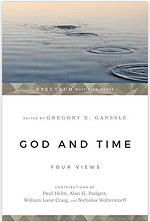|
by Kyle Deming One of the most perplexing philosophical issues for a Christian is God's relationship to time. Classical Christian thinking on this issue has commonly held that God is timeless, but many Christian theologians and philosophers have come to question this traditional view. In "God and Time: Four Views", four excellent Christian philosophers debate the nature of God and his relationship to time. Paul Helm defends the traditional view of God as existing absolutely timelessly. His primary argument for this classical view is based on the idea of divine fullness. According to Helm, temporal existence would compromise God's fullness, because there would be segments of His life that are already over. If God is timeless, however, then He experiences all of His life at once- He does not live in the fleeting present. Although the idea that God exists outside time or timelessly may sound intuitively plausible and attractive, it actually entails some rather strange conclusions upon reflection. For, if God is absolutely timeless, then He cannot know what time `now' is. Moreover, He cannot act in time. All of God's actions in the world would have to be `pre-loaded' in some sense. Thus, though it may appear that God is having a conversation with Adam and Eve in the book of Genesis, God's `responses' are really all preloaded into the world. God doesn't in any way intervene or interact in time. This view seems to make God impotent and ignorant- unable to act in time and unable to even know what time it is! Unlike many other defenders of timelessness, Helm attempts to defend a B-theory of time to avoid these difficulties. According to this view, there is no such thing as an objective `now' and all events- past, present, and future- are equally real. If the B-theory of time is correct, then there is no problem of divine action or divine knowledge. Alan Padgett defends the view of "relative timelessness." According to this view, God is the Creator of space-time, which He transcends. God still exists in time, but it is very different from our physical, measured time. God's time is infinite, but it is also immeasurable. Padgett defends his view first by refuting the B-theory of time. This, he contends, demonstrates that God is not timeless. But, says Padgett, it would be theologically inadequate to say that God is simply everlasting. On such a view, God does not transcend time in any way. Padgett thinks that his own view offers a theologically acceptable account of God's relationship to time without necessitating an absurd view of the nature of physical time. William Lane Craig argues that God exists in time since the creation of the universe but timelessly without the universe. He rejects strict timelessness because such a view cannot account either for God's actions in a temporal world or for His knowledge of tensed facts (such as, "It is now 8:00 P.M."). He rejects strict temporality (and relative timelessness) because it leads inevitably to the question, "Why didn't God create the world sooner?" Craig argues that the most plausible response is to deny that God exists in time without the universe. Nicholas Wolterstorff defends unqualified divine temporality. In addition to offering arguments against a B-theory and for an A-theory of time, Wolterstorff contends that a basic reading of the Bible gives the unmistakable impression that God exists in time and has a history. He sees the Incarnation as a definitive example of God acting in time and relating to the created world. Wolterstorff, however, refuses to side with either Craig or Padgett on God's nature without the universe. Thus, in as sense, Wolterstorff's position is entirely compatible with both Craig's and Padgett's point of view (as well as the view of someone who believes that God exists everlastingly), and the two coauthors simply make further metaphysical commitments about God's nature `before' the creation of the universe. "God and Time: Four Views" is an excellent survey of some options regarding God's relationship to time. The book had a terrific format — allowing each author and respondent sufficient room to develop their points. I also liked the fact that each author was given an opportunity to respond to criticisms. Although you had better be ready for some technical reading, I would recommend God and Time for anybody interested in surveying the different possibilities concerning this fascinating issue. |
 God and Time: Four Views by Paul Helm, Alan Padgett, William Lane Craig, and Nicholas Wolterstorff |

